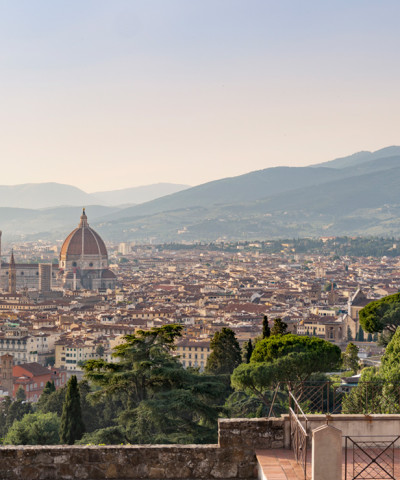Alessandro Benvenuti's career and places of the heart
Our meeting with one of Tuscany's most influential actors
“My first approach to Florence was that of a lover. Of a lover coming from a small town and discovering inexhaustible beauty and vitality” . That is how Alessandro Benvenuti describes the first time he ‘met’ Florence. An actor, film director and scriptwriter, Alessandro Benvenuti marked the history of Italian cabaret, theater and filmmaking. Since the early 1970s when, as a young twenty-year-old man, he made his debut on the Florentine artistic scene. Born in San Francesco di Pelago, just 20 kilometers away from Florence, in January 1950, Alessandro Benvenuti started the Giancattivi trio, which reached great popularity with the Non stop TV show. His theater monologue Benvenuti in casa Gori, in which he played ten different characters, met with huge success and was sold out for its whole run in over thirty years of repeat performances.
Benvenuti- who has also worked as theater artistic director (this year he was reappointed at the head of Teatri di Siena) - went back to the small screen in 2015 to play the hilarious character of Emo Bandinelli, in one of Italy’s most popular television series, I delitti del BarLume, broadcast on Sky for 10 seasons and back in 2024. The series, starring Massimo Viviani alias Filippo Timi, is based on the novels by Tuscan detective-story writer Marco Malvaldi, and is always shot in Marciana Marina, on the Elba Island.
What was Florence like, the first time you met her?
It was a unique time. Florence welcomed the world’s greatest theater companies back then. Mimes, actors, artists. There were in Florence at the time some veritable geniuses, such as Tadeusz Kantor, who experimented with theater.
You began to experience the other city. Not the Renaissance Florence, but the city of the new artistic renaissance.
Yes, at the Rifredi theater. The headquarters of the Mutual Aid Society had been converted into a center that was the home of the new satire and a benchmark for the whole of Italy.
That is where your career began…
‘Career’ was not the word on my mind back then. There was only the present for me: a present so impregnated with energy and meanings that there was no time to think about the future. There was only an amazing ‘here and now”, full of energy, exchange of thoughts and ideas.
And what was Florence in all this?
A mother. A mother who adored us, and we children adored her back. We were committed, alongside other authors such as Ugo Chiti, to rediscovering and recreating the Tuscan language, to reviving the local dialect, but in a modern way.
Then, in 1978, television gave I Giancattivi trio popularity with the Non Stop show. Francesco Nuti, Athina Cenci and you.
We did not accept to do television at first. I didn’t even have a television: I only listened to music. But in those years, there were some brilliant and bold television managers: they were not mere executives. So we accepted, and a new path opened up for all of us.
TV changed its face with you…
With us, with Massimo Troisi, with Carlo Verdone, with Roberto Benigni. Before us it was dull, Christian Democratic-style. It needed a renewal. And we interpreted it.
Even when you moved to Rome, you brought the Tuscan language with you and into your shows.
Yes, Benvenuti in casa Gori, the play written with Ugo Chiti, in which I played 10 different characters, a show that met with great success for thirty years, is very ‘Tuscan’. Which is why it is universal. Our language is our memory, our identity. I treated the Tuscan language as if it were a vegetable garden.
A vegetable garden that needs to be cultivated.
Definitely. Tuscan is both a folk and cultured language. It has deep roots and to me- a man without roots- it was a salvation, an ongoing point of reference.
What are your most beloved places in Florence?
Its theaters. The Niccolini, which has been very important in the history of Florence. La Pergola, where I saw the first play of my life, Carmelo Bene in Nostra Signora dei Turchi, and I thought: how beautiful, I want to do it too!
How do you feel when you go back to Florence?
Every time I go back, I always have a very respectful approach. I never feel that I own it, that I know it. A tour at dawn, in the streets around Via dell’Ariento. And the countryside above Fiesole, where we used to record our music. We experienced a great dream in Florence. I spent the best years of my life there. But I don’t feel nostalgic, and my heart is open to embrace the present. We need to free up some mental space for the present.









